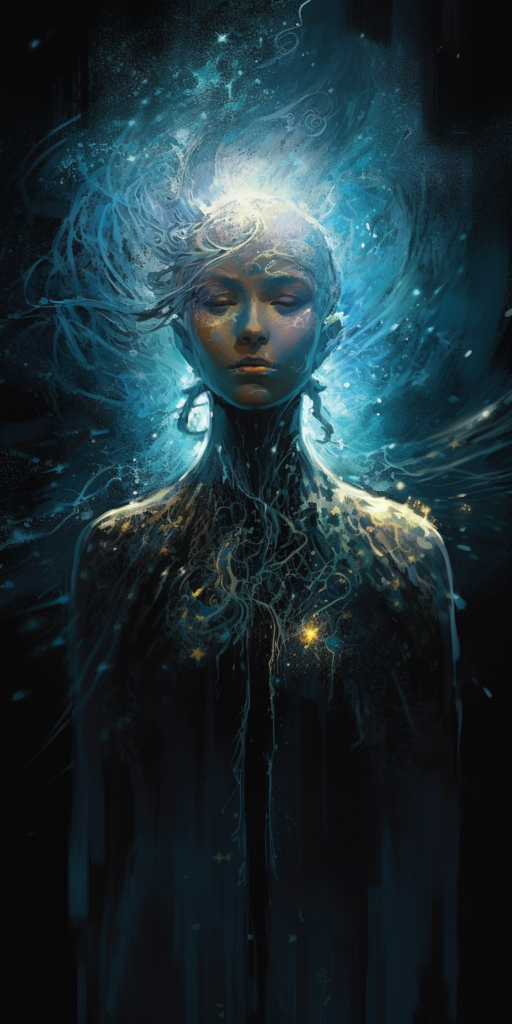Ananke, Goddess of Necessity and Fate
Ananke is a primordial goddess from Greek mythology who represents fate and necessity.

- Pantheon: Greek Pantheon
- Deity Title: Ananke, Goddess of Necessity and Fate
- Deity Symbol: A spindle, representing the thread of life
- Home Plane: Olympian Plane
- Deity Level: Greater deity
- Alignment: True Neutral
- Aliases: Necessitas, Adrasteia, Inevitability
- Superior: None
- Traditional Allies: Clotho, Lachesis, Atropos, Themis
- Traditional Foes: Eris, Nemesis
- Divine Artifact: The Moirai’s Loom, a magical loom used to weave the thread of life
- Servants: The Moirai (The Fates), The Horae (The Seasons)
- Servitor Creatures: Serpents
- Sacred Animal: The Serpent
- Manifestations: Spindles, Looms, Knots, The sound of the turning of a spindle
- Signs of Favor: A heightened sense of intuition, feeling a sense of clarity and purpose
- Worshipers: Fate weavers, Diviners, Fortune tellers, Spinners
- Cleric Alignments: Lawful Neutral, True Neutral, Chaotic Neutral
- Specialty Priests: Fate Weavers, Chronomancers
- Holy Days: The Festival of the Spindle, held on the first day of spring
- Portfolio: Fate, Destiny, Inevitability, Necessity
- Domains: Fate, Knowledge, Magic, Time
- Favored Weapon: Short Sword
- Favored Class: Cleric
- Favored Race: None specified
- Duties of the Priesthood: Maintaining the Moirai’s Loom, interpreting signs of fate, divination, foretelling the future
- Major Cult/Temple Sites: The Temple of Necessity in Athens
- Benefits: Access to powerful divination spells, resistance to manipulation of fate, enhanced perception of time and events.
Ananke, the primordial force of necessity, is an amorphous entity that defies conventional description. She exists outside of time and space, with a form that constantly shifts and changes. At times, she appears as a swirling vortex of energy, while at others she is a chaotic mass of cosmic debris. Her true form is a mystery, as she has existed since long before the emergence of humanity.
Despite her otherworldly appearance, Ananke possesses a profound intelligence and an unwavering will. She can interact with the universe in profound ways. She wields immense power, able to shape reality to her will and manipulate the fundamental forces of the cosmos. Her power is not malicious or benevolent; it simply is.
Ananke’s role in the universe is to maintain balance and order. She ensures that the laws of nature remain constant and that the forces of creation and destruction are kept in check. Her actions are not driven by morality or ethics, but by a deep-seated need to maintain equilibrium.
In ancient times, Ananke was worshipped by various civilizations as a primordial goddess of creation and fate. Her followers believed that she controlled the destinies of all living things and that her favor could bring good fortune and prosperity. Others saw her as a fearsome deity of destruction, capable of unleashing cataclysmic forces at will.
Today, few worship Ananke in any meaningful way. Her existence is known only to a select few, and even they cannot fully comprehend her nature. Nonetheless, she remains a potent force in the universe, watching and waiting for the balance to be disturbed so that she may intervene.
Currently in the World
In the beginning, Ananke emerged from the primordial chaos, the very embodiment of inevitability and destiny. As the eons passed, she watched the world take shape, guiding the threads of fate with her unerring hand.
In the early days, Ananke watched the first civilizations rise and fall, their great cities reduced to ruins by the ravages of time. She saw kingdoms come and go, wars waged and peace brokered. Through it all, she remained constant, always watching, always waiting.
But as the centuries marched on, Ananke began to grow restless. She saw the world stagnate, trapped in a cycle of endless conflict and suffering. She knew that something had to change, that a new era needed to dawn.
And so, in the 1450s, Ananke began to act. She sent her agents out into the world, weaving the strands of fate to bring about the changes she desired. Some saw her as a force for good, a bringer of progress and enlightenment. Others saw her as a tyrant, manipulating the world for her own inscrutable purposes.
Ananke cared little for the opinions of mortals. She knew that the changes she sought would not come easily, that many would suffer in the process. But she believed that it was worth the cost, that the end would justify the means.
And so, she worked tirelessly, orchestrating events behind the scenes, manipulating those with power and influence to do her bidding. Some saw through her schemes, and tried to oppose her, but they were no match for her power and cunning.
As the 1450s drew to a close, Ananke knew that her work was far from done. She could feel the forces of fate shifting, the threads of destiny beginning to weave a new tapestry. She smiled, knowing that she had played her part, that the future was in motion.
For Ananke, the present was merely a momentary blip in the grand scheme of things. She saw the world in terms of eons, watching the rise and fall of empires with detached interest. But she knew that her role was vital, that without her guiding hand, the world would be lost to chaos and darkness.
And so, she continued to work, weaving the threads of fate, shaping the destiny of nations. For Ananke, there was no end, no final goal to achieve. There was only the endless cycle of life and death, creation and destruction, the eternal dance of the cosmos.
In the end, it was not for mortals to understand the ways of the gods. All they could do was hope that they were not caught in the crossfire of their divine machinations, and pray that their fates were kind.

 Buy me a coffee
Buy me a coffee